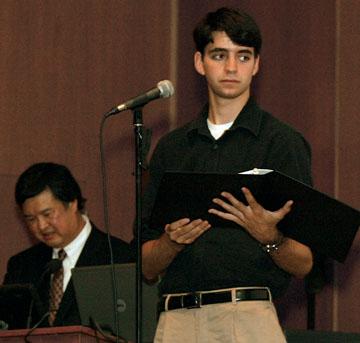
Judge Denny Chin ’75 is no stranger to legal cases that garner national media attention. As a judge in New York’s Southern District Court (he’s now an appellate court judge), Chin presided over the legal battle on Megan’s Law, considered the relative benefits of Listerine and floss in reducing plaque and gingivitis, and sentenced financier Bernard Madoff to 150 years in prison.
But it was the lesser-known case of Minoru Yasui, a Japanese-American citizen who challenged a military curfew on all people of Japanese ancestry in 1942, that brought Chin back to campus Sept. 16 to mark Constitution Day.
With Chin narrating and providing commentary, students read from the courtroom transcript the parts of the lawyers, judge, and witnesses in the Yasui trial. Yasui’s conviction for violating curfew was upheld by the Supreme Court, an early legal test of the policy that led to Japanese internment during World War II. Chin said the case has implications for today.
“There are a lot of people who believe that when civil rights come into conflict with national security, civil rights should bend,” the judge said. He added: “Sometimes, law and morals do not equate.”
Chin joined the Second Circuit Court of Appeals in April, the only Asian-American serving as a federal appeals-court judge. “It’s good to have diversity on the bench,” said Chin, who was born in Hong Kong in 1954 and came to the United States two years later. “You have a variety of perspectives, and that helps.”
He may be best known for his district-court role in the Madoff case. He remanded Madoff as soon as he pled guilty, placing him in custody. “I didn’t like that he was spending tens of thousands of dollars for private security when that money could be going to victims,” the judge said.
Chin said he’s still getting used to the Court of Appeals — reaching decisions with two other justices, rather than deliberating on his own — but is excited about the opportunity to have more of an impact on the legal system.
